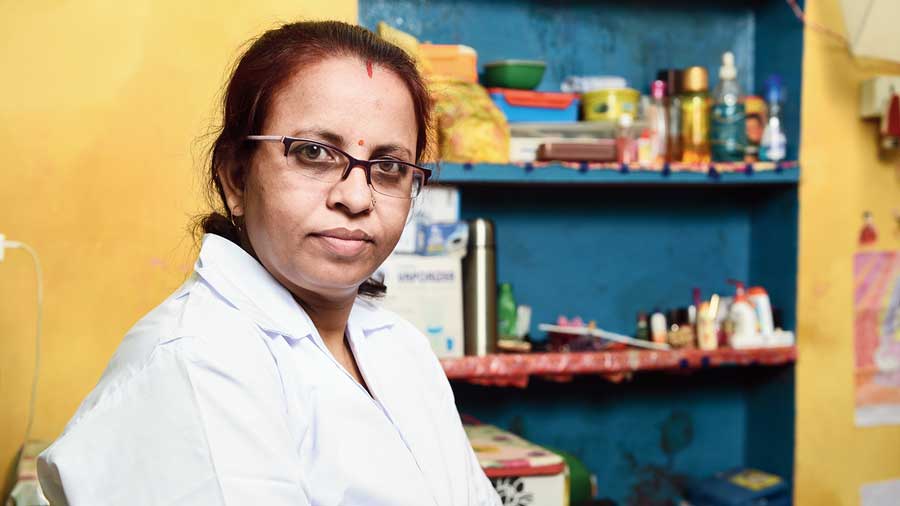Sujata Sinha Mandal appears at my south Kolkata home on an early December morning, before the Omicron wave. This is the fifth day since I have tested Covid-positive. Sujata changes and washes herself and comes right up to me.
I am alarmed. I am Covid-positive. She is not. “I am your nurse. I have come to take care of you. You cannot keep me away,” she declares. But I insist that she is to mask herself and wear a face shield and gloves when she is near me. She looks both annoyed and amused, but agrees.
Later in the course of the 12 days that she spends with me she tells me that she does not feel afraid. Certainly not of Covid.
The Sonarpur resident, the mother of a 10-year-old, has taken care of four “Covid patients”, including me, the fourth one, in the last two years.
Sujata, 40, lives with her daughter and husband, who has not worked since 2015. She needs to earn, and the pandemic, with all its threats, has been an opportunity for Sujata, an efficient and sometimes stern person.
She has been working as a nurse since 2004, whether at a nursing home or a private residence, though the last few years she has only been attending to “house cases”. She would charge the usual rates before the pandemic. But looking after a Covid patient allows her to charge more than three times the rates for a “normal patient”.
Which made her take up a Covid patient right in the middle of the first wave in 2020. “I would then wear a PPE kit,” says Sujata. She decided that the stint had been good for her in every way.
The money was good — she works for at least 10 days for a patient — and if she had been infected without falling ill it was the best way to get immunity.
“I was not vaccinated then. And I didn’t know enough at first about Covid, which helped,” she says. “Kintu ami care kori na. Patta di na. I don’t care.” Now, she is fully vaccinated.
She will not have me reminding her about keeping her distance from me and laughs at me as I try to shrink every time she approaches me. She looks annoyed again when I point out that she is coughing slightly. “If you are always pointing these things out I can’t work,” she says dismissively.
More gently, but also challengingly, she adds: “If you are afraid you can’t go out and work in this situation leaving a 10-year-old at home. Yes, I am brave. Can you do it?”
One of six siblings, Sujata grew up in a village in Hingalganj in the Sunderbans. After passing her Higher Secondary examination in 2004, she came to Sonarpur to stay with an elder brother and obtained her professional certificates in theory and practice from St John Ambulance Association and Satyarani Memorial Nursing Home in Sonarpur, respectively. She always wanted to be educated and to work. Her two sisters are homemakers. Two of her other brothers are farmers in their Chandalkhali village in Hingalganj.
A “missed call from a wrong number” introduced her to her future husband, who worked for a CESC contractor till 2015. Their daughter Tiya was born in 2012. She is a student of Class IV now, attending online classes.
Sujata’s husband, Avijit Mandal, a gentle, smiling man, chose to stay at home and look after their daughter, not accepting job offers. Sujata’s is a radical and happy family. “I am so grateful to my husband. He takes care of everything about our daughter. Her studies, taking her to the private tuitions, her care throughout the day. He is a good man,” says Sujata.
They live in a rented room in the ground floor of a building that seems to rise from platform no. 4 at Sonarpur railway station. Their life is tied up with the movement of the trains. The sound of every train vibrates through the building throughout the day. Even the narrow strip between their house and the train tracks is used for repair work by the railway — and the noise is deafening.
Sujata’s day almost coincides with the running of the trains. She gets up at 5am every day, cooks, cleans the house and usually takes the 7.20am Sonarpur local to reach the patient’s house by 8am. She does 12-hour shifts mostly. The evening meal is cooked by her husband and when she is back her daughter grabs her phone to watch YouTube. “I don’t know what she watches and she only wants ‘fast food’,” complains Sujata, but her face lights up as she speaks of her daughter. She can never manage to go to bed before midnight. “Five hours’ sleep is enough for me,” she says.
The family has never gone on a trip anywhere. “In fact, Tiya has only visited Kolkata once, when we took her to the zoo, long ago,” says Sujata. Tiya has not been to a cinema hall yet.
“Television is our only entertainment. And the mobile phone,” says Sujata. She is working hard to get a better life for her daughter, whom she wants to educate as much as possible.
The incident from her professional life she remembers was caring for a patient at the ICU of a nursing home. “The patient was severely injured in a car accident.” But Sujata does not know what happened to her, as her family could not afford her treatment and shifted her elsewhere.
At the end of 12 days, I get Sujata tested for Covid, as was previously agreed. She tests negative. She looks radiant and begins to pack.
